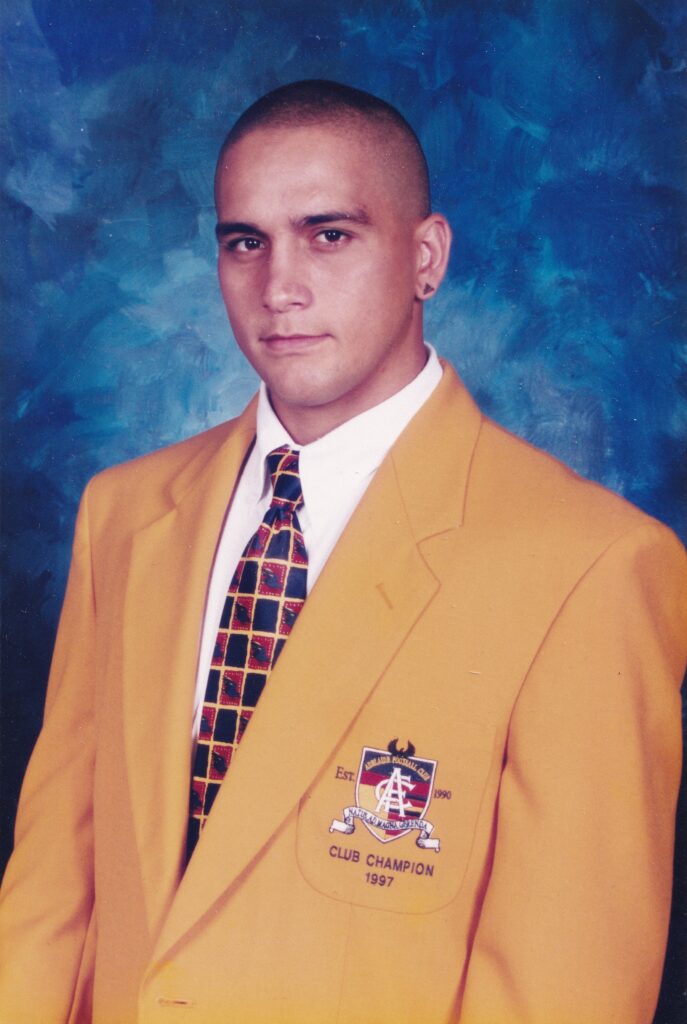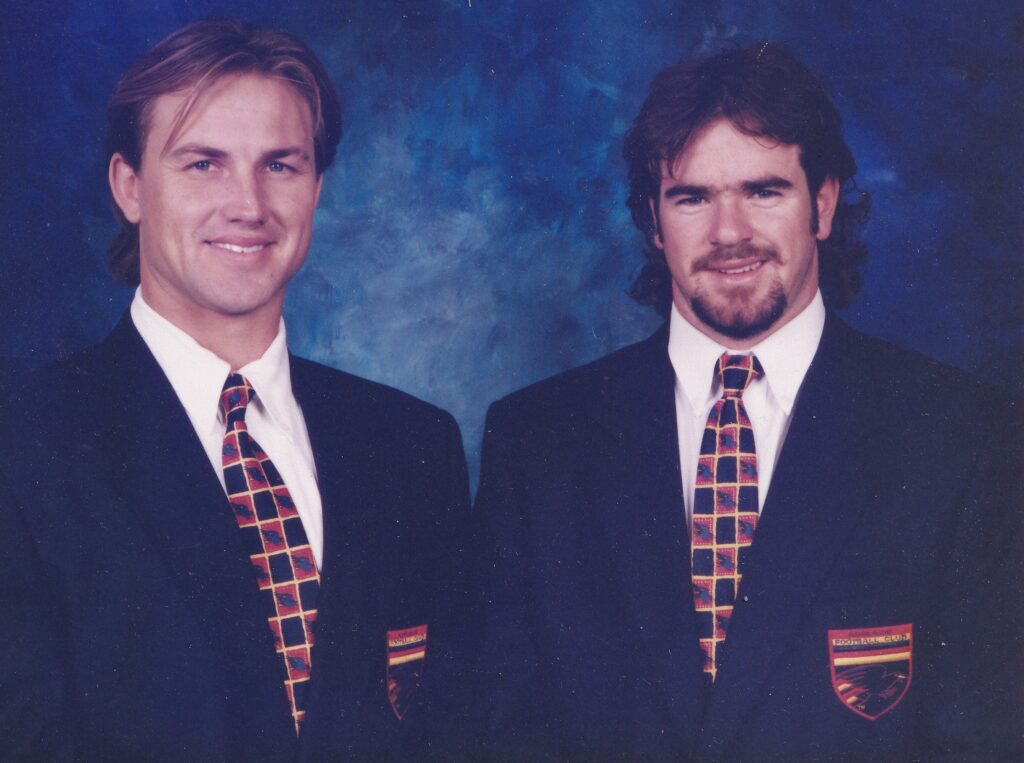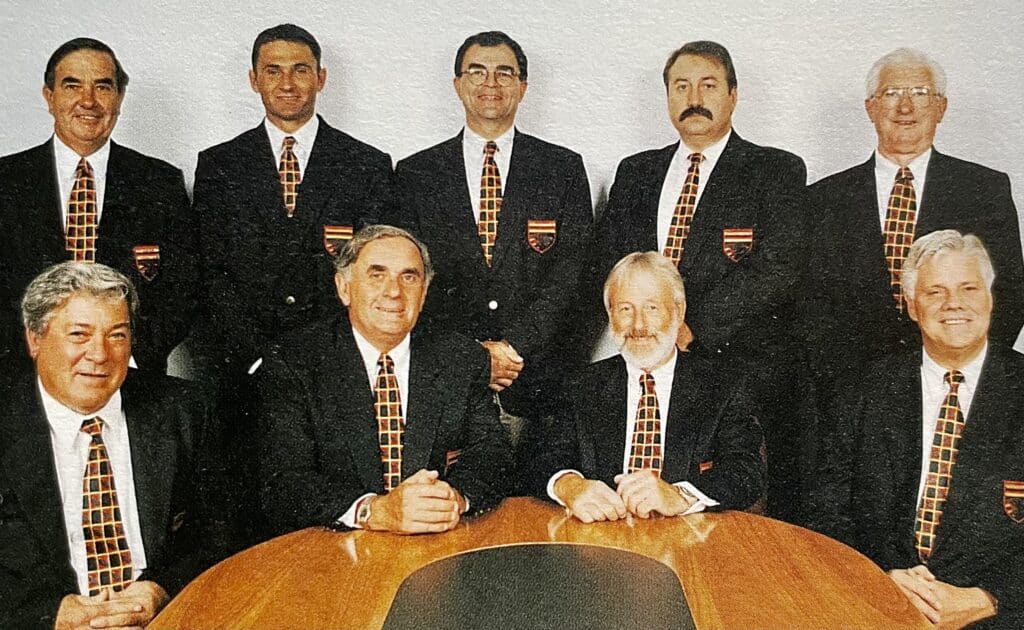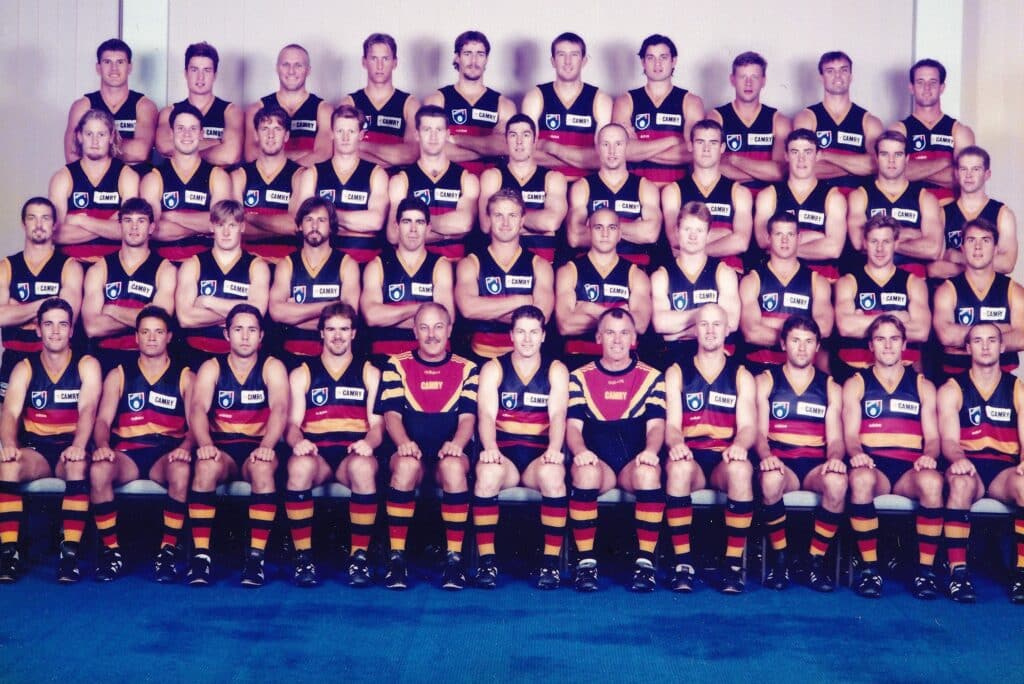1997
Games Won 17
Ladder Position 1
Premiership position: Premiers in 16-team competition (17 wins, 9 losses). End of minor round: 4th (13 wins, nine losses).
Coach: Malcolm Blight. Assistant coach: Darel Hart.
Captain: Mark Bickley. Vice-captain: Nigel Smart.
Season 1997 will always be remembered as the year the Adelaide Football Club won its first AFL premiership, seven years after the Club was formed.
On September 27, Adelaide played its 159th game in the AFL and became the first team to win four consecutive finals to clinch the Cup, defeating hot favourite St Kilda by 31 points at the Melbourne Cricket Ground.
The remarkable record leap to the top from 12th in 1996 came after a turbulent period at the end of the previous season. Robert Shaw’s two years as coach ended and he was replaced by South Australian football great Malcolm Blight, who immediately cut some senior players including the club’s first two captains Chris McDermott and Tony McGuinness, Andrew Jarman and Greg Anderson.
It was not a smooth path to the premiership. Adelaide had a wretched run with injuries, including to its 1997 All-Australian representatives Mark Ricciuto and Tony Modra. It suffered a stinging loss to new side Port Adelaide in the first South Australian AFL Showdown. And two losses in the last three rounds cost the Crows a higher ranking, after it had pushed to the top of the ladder.
Adelaide won 13 minor round games to finish fourth at the end of the minor round but then knocked out West Coast, Geelong and the Western Bulldogs in a stirring run through September to reach its first grand final.
The Crows completed their mission by recovering from a half-time deficit of 13 points to add 14 goals in the second half, including 8.0 in the final term when Darren Jarman kicked five goals.
Blight became the first Adelaide premiership coach, Mark Bickley the first Crows premiership captain and Andrew McLeod the Club’s first Norm Smith Medallist.
Blight had left coaching in 1994 after guiding Geelong to three losing grand finals, vowing not to coach again. But after two years as a media analyst he agreed to become Adelaide’s third AFL coach.
Former Norwood coach Neil Craig also joined the Crows as a specialist coach in charge of the fitness program. Darel Hart was retained as assistant coach and Bickley, one of nine original Crows still on the list, was named captain.
There were 12 changes to the playing squad. Adelaide selected young Victorian ruckman Tom Gilligan with pick 13 in the national draft and added seven players to the squad through trades, including former Norwood defender Brett James (from Collingwood) and Footscray’s Barry Standfield.
The AFL’s first rookie draft was held near the start of the season and the Crows selected West Adelaide pair Ben Marsh and Steven Coghill. Under the new rules, they remained as West players unless the Crows delisted a player from its 42-man squad.
The opening few weeks of the season did little to suggest a premiership was achievable.
Six players made their debut for injury-hit Adelaide in the opening round win against Brisbane, including Standfield who kicked five goals alongside Modra (seven goals). James, home after three years, picked up the three Brownlow Medal votes and Simon Goodwin made his debut.
But the next week the Crows had a bad day at the MCG, trailing Richmond by 41 points early in the second term. Although the Crows fought to get within one point during the final term, they faded and lost by 28. The new coach made his presence felt post-game with the media and hit the headlines with his infamous spray about David Pittman. “I was absolutely fuming,” admitted Blight, who later apologised to the ruckman.
There was another away loss, by three goals, to Carlton (wearing a light blue sponsor promotional guernsey). Wingmen Simon Tregenza and Kym Koster returned for their first games after knee reconstructions and 18-year-old ruckman Tom Gilligan was elevated from the SANFL reserves to make his AFL debut, as the Crows battled to cover injuries to its big men.
And then Adelaide lost the first Showdown to new rival Port Adelaide, stunning the Crows home crowd. Modra kicked seven goals and the side finished strongly to kick six goals in the last term but lost by 11 points. Many players were shattered and embarrassed but Blight’s message was simple: “18 games to go”. He later explained: “I always thought it was just one game, it was never going to make or break the season for either side.” Defender Rod Jameson was suspended for three weeks for attempting to strike Port’s Scott Cummings.
Adelaide’s 1994 Club Champion Shaun Rehn returned from his second knee reconstruction in round five and the Crows won its first game in Melbourne for more than a year, by 50 points against top team Western Bulldogs. Modra kicked eight goals and Standfield booted five against his old club.
A one-point loss to Collingwood in a thrilling contest at Victoria Park left Adelaide in 13th place with a 2-4 record but five consecutive wins against some of the other battling sides helped restore confidence.
Matthew Robran and 1996 Club Champion Matthew Liptak were prominent in their first AFL games of the season as Adelaide kicked nine last quarter goals against Essendon. The Crows then smashed 1996 grand finalist Sydney by 89 points, beat Hawthorn by 14 points at Waverley, won at Perth’s Subiaco Oval for the first time, against Fremantle, and cruised to a 52-point win against bottom side Melbourne at the MCG.
Blight had set a consistent approach for the Club’s interstate program, regardless of results. Although this was just one factor, three away wins in a row stopped most of the media debate.
Modra took another AFL mark of year against North Melbourne in round 12 but this time the Roos won by 22 points. Blight then returned to his old territory at Kardinia Park but it made no difference to Adelaide’s bleak record at the venue.
Finals-bound West Coast was held to one goal in the first half as Adelaide kicked ten, on the way to a 75-point win. The following week the Crows came from behind to beat another contender, St Kilda, by ten points, in what Blight described as the “most significant win of the (regular) season”. Modra only kicked one goal in his 100th AFL game but it was his 400th in the AFL.
After a 31-point loss to Brisbane at the Gabba, a 137-point smashing of Richmond gave the Crows a huge percentage boost and closed Robert Walls’ coaching career at Punt Road. Darren Jarman starred with seven goals and Ricciuto played his 100th AFL game but was starting to struggle with a sore groin.
Wins against Carlton and Port lifted the Crows to the top of the ladder with three rounds to play. Adelaide made a slow start to the second Showdown, when Port jumped to a five-goal lead after kicking with a strong breeze. The Crows still trailed by 23 points at the last break but held ‘home’ side Port scoreless in the wet final term and added 4.6 to win by seven points. Rehn dominated after a shift into the ruck and combined with McLeod to break the stalemate, Troy Bond gave the Crows the lead for the first time and then Peter Vardy sealed it from the boundary line.
“The first time we played Port, it is no doubt that some senior players went over the top,” Blight said of lessons from the first Showdown.
They didn’t stay at the top for long, however, losing to the Western Bulldogs by 43 points at Football Park and finishing the minor round with a four-point loss to lowly Essendon at Princes Park after leading by 31 points at half-time. Between these games Adelaide secured a home final and ruined Collingwood’s finals hopes with a nine-point win in the wet at Football Park on a Monday night.
Adelaide finished fourth and under the finals system used in 1997, hosted fifth-placed and finals-hardened West Coast in the first qualifying final. The first AFL final ever played at Football Park was moved from Saturday evening to Sunday afternoon to allow the Seven Network to screen the funeral of Princess Diana.
Ricciuto was a late out (and would soon have surgery to repair two hernias) but the Crows started well against a strong breeze and then led by 16 points at half-time. West Coast made better use of the wind in the third term and was only eight points behind before Modra kicked the last two goals of the quarter. Adelaide went on to win by 33 points, with Bickley best on ground.
Back at Football Park the following week, Adelaide came from behind at three-quarter-time to eliminate Geelong, winning the second semi-final by eight points. Sadly, forward Peter Vardy broke his collarbone moments before kicking a crucial last quarter goal.
Modra was next to suffer a season-ending injury, in the preliminary final against the Western Bulldogs at the MCG. His knee collapsed late in the first quarter and Adelaide was in trouble, trailing by 31 points at half-time. Blight made a raft of changes at the main break and the game started to swing. Down by 22 points at three-quarter-time, Adelaide then kicked the only four goals of the last quarter to win a thriller by two points. Jarman put the Crows in front with his third goal with 105 seconds left and it was game over when Tyson Edwards marked a desperate kick forward by Bulldogs star Scott West.
Adelaide then claimed the AFL’s biggest prize, staging another exciting comeback after trailing St Kilda by 13 points at half-time. Down to one player on the bench after early injuries to Rod Jameson and Clay Sampson, the Crows hit the front midway through the third term when Jarman kicked his first goal. He booted four more within ten minutes early in the final term to give Adelaide a 27-point lead and his sixth goal later in the game ended St Kilda’s dream.
McLeod completed a rare double by adding the Club Champion award to his Norm Smith Medal as best on ground in the grand final. Strangely, he polled only one vote in the Brownlow Medal count and was not selected in the All-Australian side.
All-Australian honours went to Ricciuto and Coleman Medallist Modra, who booted 84 goals. Ricciuto led the Brownlow count after polling 18 votes in the first 14 rounds but stalled because of his injuries and finished equal fourth.
Jarman kicked 39 goals and was runner-up to McLeod in the best-and-fairest in a year when 35 players represented the Crows and 21 won a premiership medal.
Round 1 Adelaide 20-12 (132) d Brisbane 14-12 (96) at Football Park Crowd – 36,632
R 2 Richmond 19-14 (128) d Adelaide 15-10 (100) MCG Crowd – 61,138
R 3 Carlton 15-8 (98) d Adelaide 12-8 (80) Optus Oval Crowd – 22,145
R 4 Port Adelaide 11-17 (83) d Adelaide 11-6 (72) Football Park Crowd – 47,256
R 5 Adelaide 19-7 (121) d West. Bulldogs 9-17 (71) Optus Oval Crowd – 13,570
R 6 Collingwood 13-6 (84) d Adelaide 11-17 (83) Victoria Park Crowd – 24,633
R 7 Adelaide 18-18 (126) d Essendon 11-7 (73) Football Park Crowd – 38,725
R 8 Adelaide 22-12 (144) d Sydney 8-7 (55) Football Park Crowd – 40,047
R 9 Adelaide 14-18 (102) d Hawthorn 13-10 (88) Waverley Park Crowd – 23,463
R 10 Adelaide 16-9 (105) d Fremantle 10-12 (72) Subiaco Crowd – 22,464
R 11 Adelaide 14-13 (97) d Melbourne 5-15 (45) MCG Crowd – 27,463
R 12 Nth Melbourne 16-9 (105) d Adelaide 12-11 (83) Football Park Crowd – 43,345
R 13 Geelong 17-8 (110) d Adelaide 7-12 (54) Kardinia Park Crowd – 20,236
R 14 Adelaide 16-10 (106) d West Coast 4-7 (31) Football Park Crowd – 39,221
R 15 Adelaide 10-16 (76) d St Kilda 9-12 (66) Football Park Crowd – 39,921
R 16 Brisbane 17-16 (118) d Adelaide 13-9 (87) Gabba Crowd – 21,348
R 17 Adelaide 29-11 (185) d Richmond 7-6 (48) Football Park Crowd – 36,297
R 18 Adelaide 18-19 (127) d Carlton 13-8 (86) Football Park Crowd – 42,458
R 19 Adelaide 9-11 (65) d Port Adelaide 9-4 (58) Football Park Crowd – 45,498
R 20 West. Bulldogs 16-7 (103) d Adelaide 7-18 (60) Football Park Crowd – 39,632
R 21 Adelaide 6-12 (48) d Collingwood 5-9 (39) Football Park Crowd – 37,661
R 22 Essendon 16-6 (102) d Adelaide 14-14 (98) Optus Oval Crowd – 25,164
1st Qualifying Final Adelaide 14-15 (99) d West Coast 9-12 (66) Football Park Crowd – 43,671
2nd Semi Final Adelaide 11-10 (76) d Geelong 9-14 (68) Football Park Crowd – 46,101
2nd Preliminary Final Adelaide 12-21 (93) d West. Bulldogs 13-13 (91) MCG Crowd – 70,088
Grand Final Adelaide 19-11 (125) d St Kilda 13-16 (94) MCG Crowd – 99,645
Other news
- Adelaide’s timekeeper Wally Smith died a week after the premiership win, after a battle with cancer. A life member of both the West Torrens football and cricket clubs, Wally worked at Crows home games in the first seven seasons. He travelled to Melbourne for the preliminary final and sounded the final siren. Players and staff visited him in hospital after the grand final and he proudly held the Cup.
- Former Crows player Tony Hall was one of three new Board directors in 1997. He was joined by Wally Miller and Stephen Young after 15 candidates were assessed by the SA Football Commission. They replaced interim and inaugural Board members Rick Allert and Adrian Sutter.
- South Australian businessman Robert Gerard accepted the Club’s offer to be No 1 ticketholder. He replaced SANFL president Max Basheer.
- Darren Jarman, Tony Modra, David Pittman, Mark Bickley, Mark Ricciuto and Ben Hart represented South Australia in the State-of-Origin game against Victoria at Football Park. Modra kicked four goals but Victoria won by eight points. Andrew McLeod played for the Allies in their win against Western Australia.
- Crows premiership players Brett James and Aaron Keating celebrated another win the following weekend, playing for Norwood in its 73-point SANFL grand final win over Port Adelaide.
- Adelaide retained a surplus of $351,000 in 1997 after distributing $1.01 million to the SANFL and its annual $400,000 AFL licence repayment. The salary cap for the players was $3 million.
- “Shed” parties for Crows members started later in the season in the old State Supply warehouse, east of Football Park.
- Inaugural Crow Andrew Jarman returned to Norwood and the SANFL after being cut by Adelaide at the end of 1996 and won the 1997 Magarey Medal. He tied with Sturt’s Brodie Atkinson. He also played in Norwood’s premiership side.
- Chad Cornes, the eldest son of inaugural Crows coach Graham Cornes, was drafted from Glenelg by Port Adelaide with pick nine at the AFL national draft.
- Adelaide launched its first official website (afc.com.au).
Awards and Achievements
All Australian: Mark Ricciuto, Anthony Modra
Best Team Man: Kym Koster
Coach’s Award: Mark Bickley
Emerging Talent: Kane Johnson
Leading goalkicker: Anthony Modra
Norm Smith Medal: Andrew McLeod
John Coleman Medal: Anthony Modra
AFL Mark of the Year: Anthony Modra
Jock McHale Medal: Malcolm Blight
List changes
In: Brett James (Collingwood), Trent Ormond-Allen (Melbourne), Clay Sampson (Melbourne), Tim Cook (Central District), Aaron Keating (Norwood), Nick Laidlaw (Sturt), Barry Standfield (Footscray), Tom Gilligan (Dandenong U18), Andrew Eccles (Northern U18), Chad Rintoul (East Fremantle), Greg Dempsey (West Adelaide), Ben Parker (Murray U18)
Out: Chris McDermott, Tony McGuinness, Andrew Jarman, Greg Anderson, Wayne Weidemann, Nick Pesch (Melbourne), Matthew Powell, Scott Hodges (Port), David Brown (Port), Matthew Kluzek, Jonathon Ross, Brendon Logan
First game players
Simon Goodwin, v Brisbane at Football Park, 30/3/97 (player debut order 77)
Brett James, v Brisbane at Football Park, 30/3/97 (78)
Aaron Keating, v Brisbane at Football Park, 30/3/97 (79)
Chad Rintoul, v Brisbane at Football Park, 30/3/97 (80)
Barry Standfield, v Brisbane at Football Park, 30/3/97 (81)
Brent Williams, v Brisbane at Football Park, 30/3/97 (82)
Tim Cook, v Richmond at the MCG, 5/4/97 (83)
Trent Ormond-Allen, v Richmond at the MCG, 5/4/97 (84)
Tom Gilligan, v Carlton at Optus Stadium, 13/4/97 (85)
Clay Sampson, v Richmond at Football Park, 26/7/97 (86)
Related links
| Club Champion top dozen |
| 1: Andrew McLeod 409 votes 2: Darren Jarman 389 3: Mark Ricciuto 296 4: Ben Hart 272 5: Peter Caven 270 6: Mark Bickley 228 7: Nigel Smart 227 8: Kym Koster 195 9: Anthony Modra 167 10: David Pittman 157 11: Shaun Rehn 154 12: Rod Jameson 153 (The five members of the match committee each selected their top five and then rated their game on a scale of 1-10) |
| Leading goalkickers |
| 84.45 Tony Modra 39.17 Darren Jarman 28.21 Peter Vardy 24.14 Matthew Robran 23.10 Barry Standfield 20.9 Troy Bond 13.8 Nigel Smart |
| Brownlow Medal votes |
| 18 Ricciuto 13 D. Jarman 8 Koster 5 Jameson 3 Bickley, James, Robran 2 Rehn, Vardy, Connell 1 McLeod, Modra, Pittman |


1997 All Australians Tony Modra and Mark Ricciuto


Coleman Medallist Tony Modra
The 1997 squad

Back row (from left): Jason McCartney (8), Ashley Fernee (45), Matthew Robran (10), Tom Gilligan (31), David Pittman (15), Shaun Rehn (52), Aaron Keating (20), Barry Standfield (16), Brett Chalmers (19), Shane Ellen (13). Third row: Kane Johnson (28), Andrew Eccles (33), Brent Williams (29), Ben Hart (34), Peter Caven (44), Sean Tasker (4), Rod Jameson (35), Nick Laidlaw (25), Simon Goodwin (36), Matt Connell (14), Greg Dempsey (38). Second row: Kym Koster (5), Mark Viska (49), Peter Vardy (30), Simon Tregenza (12), Darren Jarman (3), Tony Modra (6), Andrew McLeod (23), Trent Ormond-Allen (21), Clay Sampson (24), Chad Rintoul (42), Tim Cook (2). Front row: Brett James (11), Troy Bond (18), Ben Parker (39), Mark Ricciuto (32), Malcolm Blight (coach), Mark Bickley (captain, 26), Darel Hart (assistant coach), Nigel Smart (7), Adam Ugrinic (22), Matthew Liptak (27), Tyson Edwards (9). Absent: Matthew Collins (17).
1997 Jumpers
Adidas had its name first appear on the front of the jumper in 1997, when Adelaide won its first AFL premiership. The Crows wore white shorts in the grand final. The Crows wore a slightly different version of the pre-season jumper in a trial against Essendon, with the collar and both sleeves gold.
Shaun Rehn in 1997; Darren Jarman; Matt Connell; Ben Hart and Mark Bickley in the grand final jumper; Trial game jumper with Greg Dempsey, Peter Vardy, Matthew Robran, Chad Rintoul and Jason McCartney.